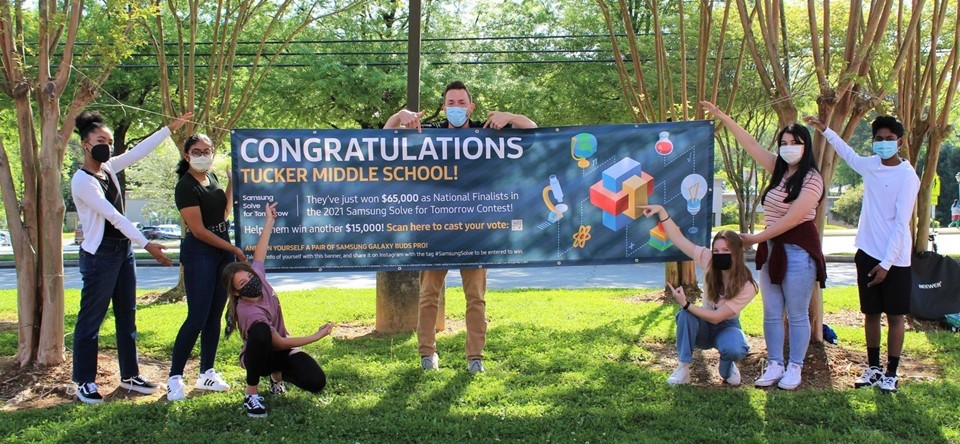
Students at an Atlanta-area middle school designed a device to help victims of human trafficking at the nation’s busiest airport — Hartsfield-Jackson Atlanta International. Motivated by statistics of human trafficking, a group of students from Tucker Middle School consulted experts in the government and at the Georgia Tech Research Institute (GTRI) — the nonprofit applied research division of the Georgia Institute of Technology (Georgia Tech).
The student group entered their design into the Samsung Solve for Tomorrow contest, and now, Tucker Middle School is one of 10 schools in the country that advanced to the National Finalist Stage.
STEM@GTRI’s (the K-12 educational arm of GTRI) long-term partnership with Dekalb County Public Schools meant that the school’s STEM Coordinator, Nathan Williams, had a way to connect the expertise of GTRI with his students to improve their design. Throughout their design process, students have been able to ask questions, get feedback, and learn new ideas from STEM@GTRI and collaborating researchers.
“Georgia Tech Research Institute played an integral role throughout this entire competition,” Williams said. “They gave generously of their time, providing guidance, feedback, and subject-area expertise, from the early stages of product design and development all the way to the end, helping us prepare for our finalist live pitch.”
Clint Zeagler, Ph.D., from Georgia Tech’s Institute for People and Technology, provided the group with training and resources on human-centered design and wearable technology – two fundamental concepts crucial to the success of their on-body, adhesive-based RFID tracker.
To support in understanding the physics and engineering behind RFID and wireless communication, Kevin Berman, research scientist II from GTRI’s Aerospace, Transportation, and Advanced Systems (ATAS) Laboratory, provided a mini-lesson to students, coached them on the technical aspects of their pitch, and posed mock questions they could face during judging.
Therese Boston, senior research associate, and Tyler Kinner, research scientist II, from STEM@GTRI, provided additional feedback to the team on their presentation and pitch.
“One of the primary objectives of STEM@GTRI is to increase awareness of STEM education paths and career opportunities among Georgia’s K-12 community,” said STEM@GTRI Director Leigh McCook. “By connecting students and teachers directly with researchers working in STEM fields, we are able to not only provide technical mentoring for this competition, but also mentor students through design and problem-solving. It was also a fantastic opportunity to engage students in exploring what it’s really like to work as a scientist, engineer, and researcher. The contributions of these researchers and their time working with the Tucker Middle School team will continue to be valuable for the students well after the final competition winners are announced.”
The Tucker Middle School team already won $65,000 in technology funding for their school and could potentially win $130,000 if they become one of the top three schools in the Samsung contest. The national finalist pitch competition was held April 28.
Watch of video of the students' project below.

Georgia Tech Research Institute (GTRI) is the nonprofit, applied research division of the Georgia Institute of Technology (Georgia Tech). Founded in 1934 as the Engineering Experiment Station, GTRI has grown to more than 2,700 employees supporting eight laboratories in over 20 locations around the country and performs more than $600 million of problem-solving research annually for government and industry. GTRI's renowned researchers combine science, engineering, economics, policy, and technical expertise to solve complex problems for the U.S. federal government, state, and industry. Learn more at https://www.gtri.gatech.edu/ and follow us on LinkedIn, Twitter, Facebook, and Instagram.
Writer: Tyler Kinner
Feature photo caption: Tucker Middle School students celebrate their advancement to the national finals. Photo courtesy of Tucker Middle School.





